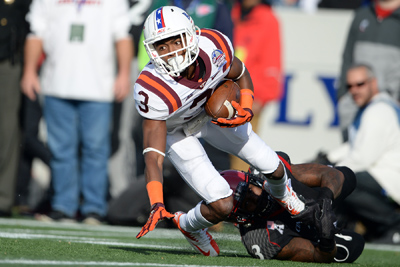Dec 14, 2017Hokie Mental Health

In 2016, an athletic trainer for the Virginia Tech football team headed to a dorm room to check on a student-athlete who had sustained a concussion during practice. That check-up likely saved the player’s life.
An article from HokieSports.com explains that Austin Cannon, an offensive lineman on the Virginia Tech football team, had suffered the concussion after a series of difficult events in his life, including a death in the family, cancer diagnosis for his father, and a break-up. After the concussion, he stabbed his leg with a knife.
“I think the concussion kind of topped it off,” Cannon said. “It was the last straw. I immediately regretted doing it. I thought it was selfish of me to do what I did.”
The wound was stabilized by the sports medicine staff and rescue personnel. Afterward, Cannon was admitted to New Horizons Crisis Stabilization in Radford, Va., for treatment. He currently meets with Gary Bennett, PhD, Sport Psychologist in the Virginia Tech athletics department, to continue his recovery.
Dr. Bennett has been working with Hokie athletes since the mid-1990s — which made Virginia Tech one of the first schools in the country to hire a sports psychologist. He started as a liaison between the athletics department and the on-campus Cook Counseling Center but has been the department’s full-time sport psychologist since 2007.
With numerous pressures and stresses tugging at them, collegiate student-athletes often struggle with mental health issues. Yet, one challenge they face is that they often must seek help on their own.
“The biggest thing that I see is anxiety or stress,” Dr. Bennett said. “[Athletes] say that their lives are so stressful, and I don’t know that people outside of here would appreciate what they have to go through, but to me, it’s [being a student-athlete] like having two full-time jobs.
“Depression is probably the second,” he continued. “Every year, we have a handful of student-athletes that we have to hospitalize because they’re so depressed that they’re having thoughts of hurting themselves. You don’t know what would have happened if we didn’t have this resource available, but we’ve seen what would have happened at other schools that don’t have a psychologist available. I think too often that’s the impetus for an athletics department to start a program – after something tragic has happened.”
Since Dr. Bennett has been working with Virginia Tech athletics, he’s seen more and more athletes take advantage of mental health services. At first, he might only see 20 to 30 athletes a year. That number was up to 282 last year.
“The numbers increase every year, and there is a huge push by the NCAA to have resources available for student-athletes who are having mental health issues,” Dr. Bennett said. “We were one of the first schools to have a position in house, but I think now about 10 of the [Atlantic Coast Conference] schools have similar positions, and nationwide, the number continues to increase.”
Some may think the rising numbers of patients is cause for alarm. Not so, says Paul Knackstedt, PsyD, MS, MA, Staff Counselor in in the Cook Counseling Center and for Virginia Tech athletics.
“At the end of the day, Dr. Bennett and I see that as a good thing that they are coming forward,” he explained. “Are there more things that could be addressed before the individuals come in to give some education and provide some skills that they could practice before they get to us? I think so. We haven’t quite found the method to get the information and deliver these group services often to big chunks of the student-athlete population. We’re working on that and doing our best to get more information to more people, but ultimately, Dr. Bennett and I don’t see the high numbers as something that we need to continually address.”
Some of the steps Dr. Bennett and Dr. Knackstedt have taken include meeting with teams to inform them about the sports psychology services available. They also hold a “Mindfulness Workshop” each semester to help athletes cope with stress, but they often have difficulty getting attendees.
“It’s a work in progress, I’ll be honest with you,” Dr. Knackstedt said. “I think our goal is to continue to offer unique and dynamic services that can meet the needs of people.
“Part of what we’re looking at is how we can get the information to student-athletes without adding another big obligation to their weekly schedules,” he continued. “That’s what we’re up against in terms of disseminating the information to the appropriate people — the time crunch and going up against other obligations that student-athletes take on when they do have the time.”
Already a leader in the field, the Virginia Tech athletics department will continue its proactive approach with sport psychology. It hopes to maintain forward movement to develop a vision for care in the long-term.
“We need more staffing, and we’re working on that – At a larger level [nationwide], we need to keep getting the word out there that student-athletes aren’t immune from having mental health issues,” Dr. Bennett said. “They have a lot of the same issues that non-student-athletes have, and on top of that, the stress of being a student-athlete – So getting the word out there and making sure that schools have the resources in place, hopefully within departments, is key.”


